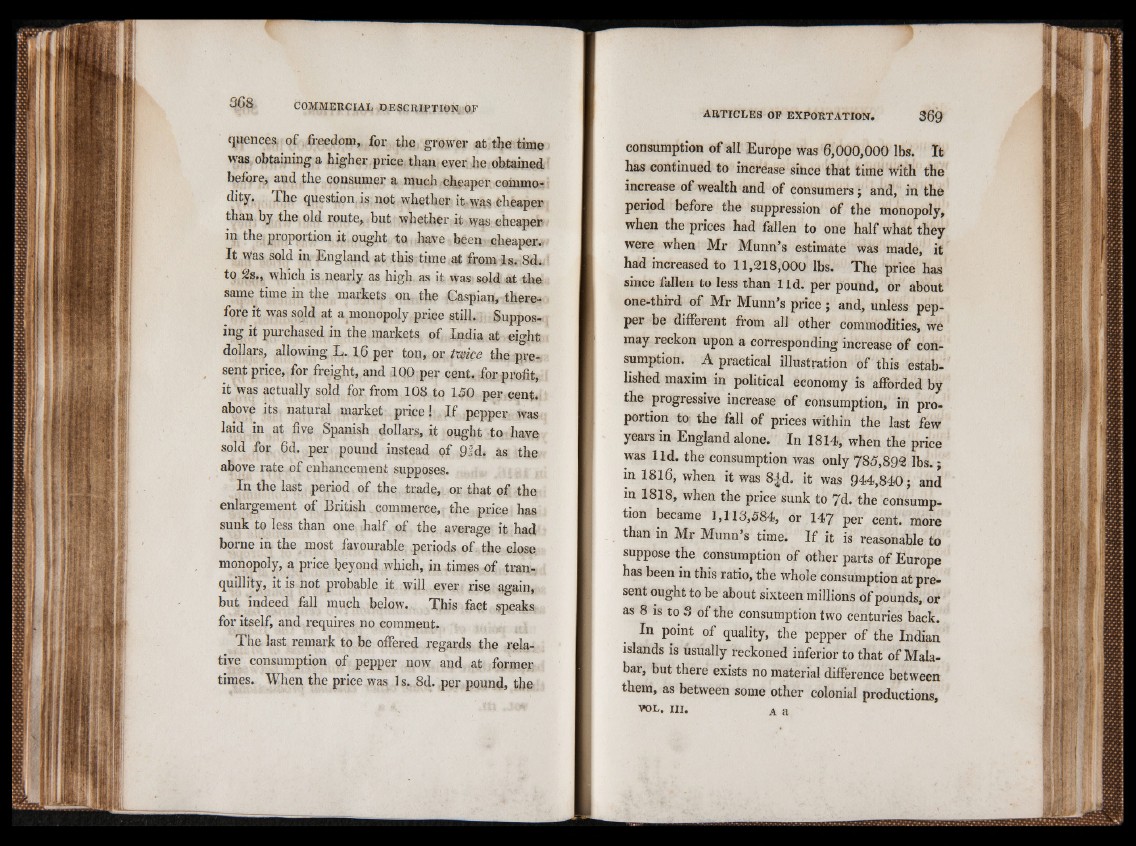
quences, of freedom, for the grower at the time
was obtaining a higher price than ever he obtained
before, and the consumer a much cheaper commodity.
The question, is not whether it-was cheaper
than by the old route, but whether it was cheaper
in the proportion it ought to have been cheaper.*
It was sold in England at this time,at from Is. 8d.
to 2s., which is nearly as high as it was sold at the
same time in the markets on the Caspian, therefore
it was sold at a monopoly price still. Supposing
it purchased in the markets of India at eight
dollars, allowing L. 16 per ton, or twice the present
price, for freight, and 1Q0 per cent, for profit,
it was actually sold for from 108 to 150 per cent,
above its natural market price 1 If pepper was
laid in at five Spanish dollars, it ought to have
sold for 6d. per pound instead of 9Jd. as the
above rate of enhancement supposes.
In the last period of the trade, or that of the
enlargement of British . commerce, the price has
sunk to less than one ¡half of the average if had
borne in the most favourable periods of the close
monopoly, a price beyond which, in times of tranquillity,
it is not probable it will ever rise a§ain,
but indeed fall much below. This fact speaks
for itself, and requires no comment.
The last remark to be offered regards the relative
consumption of pepper now and at fprmer
times. When the price was 1 s. 8d. per pound, the
consumption of all Europe was 6,000,000 lbs. It
has continued to increase since that time with the
increase of wealth and of consumers; and, in the
period before the suppression of the monopoly,
when the prices had fallen to one half what they
were when Mr Munn’s estimate was made, it
had increased to 11,218,000 lbs. The price has
since fallen to less than lid . per pound, or about
one-third of Mr Munn’s price ; and, unless pepper
be different from all other commodities, we
may reckon upon a corresponding increase of consumption.
A practical illustration of this established
maxim in political economy is afforded by
the progressive increase of consumption, in proportion
to the fall of prices within the last few
years in England alone. In 1814, when the price
was lid . the consumption was only 785,892 lbs. •
in 1816, when it was 8|d . it was 944,840; and
m 1818, when the price sunk to 7d. the consumption
became 1,113,584, or 147 per cent, more
than m Mr Munn’s time. If it is reasonable to
suppose the consumption of other parts of Europe
has been in this ratio, the whole consumption at present
ought to be about sixteen millions of pounds, or
as 8 is to 8 of the consumption two centuries back.
In point of quality, the pepper of the Indian
islands is usually reckoned inferior to that of Malabar,
but there exists no material difference between
them, as between some other colonial productions,
VOL. III. A a